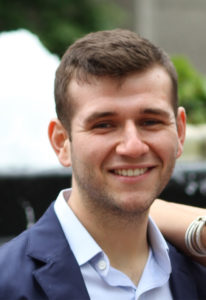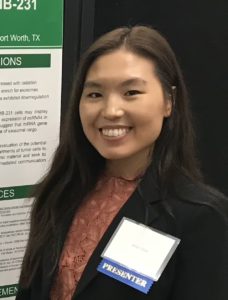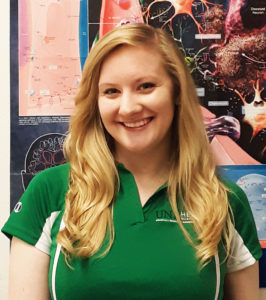2020 – 2021 T32 Fellows
|
|
Jamie ChoeDepartment of Microbiology, Immunology, and Genetics Mentor: Harlan P. Jones, Ph.D. LinkedIn: Jamie Choe Research Interests:
|
| My research is focused on investigating the nexus between neurobiology and immunology from the perspective of crosstalk between the central nervous system and immune system during a critical perinatal window of development. Specifically, I am interested in understanding how environmental insults, such as “toxic” psychosocial stress, during the neonatal/perinatal period can impact the ontogeny of adaptive immunity and self-tolerance. Although the deleterious effects of early life stress (ELS) on human health have been demonstrated in primary literature based on ELS exposures increasing the risk for adult-onset cardiovascular, metabolic, and psychiatric disorders, the effects of ELS have only recently begun to be studied in the context of immune system development and dysregulation. Furthermore, there is a scarcity of published research investigating relationships between ELS and autoimmune disorders. The direction of my research aims to address these fundamental questions linking ELS and self-tolerance based on the potential for early life events to act as a primer for autoimmune disease susceptibility later in life through persistent effects on adaptive immunity. The findings of this research will have the potential to support the implementation of evidence-based strategies to address autoimmune disease in humans from a preventive medicine perspective. | |
 |
Spencer CushenDepartment of Physiology and Anatomy Mentor: Styliani “Stella” Goulopoulou, PhD Twitter: @Spencer_Cushen Research Interests:
|
| My studies are focused on the contribution of cell-free DNA to the vascular dysfunction present in pregnancy complications. Mitochondrial DNA (mtDNA) has been noted to be increased in pregnant women suffering from high blood pressure with end-organ damage (preeclampsia). mtDNA is an immunostimulatory molecule, and our lab has previously demonstrated that pregnant rats were given a mtDNA mimetic express preeclampsia-like features; however, its source and function in human pregnancy is currently unknown. I am addressing this in approximately three parts: 1) two observational studies in human pregnancy to more precisely measure mtDNA in blood, 2) in vitro and ex vivo experiments to determine the source and cause of mtDNA release, and 3) experiments to determine the effect of in vivo administered mtDNA on coronary arteries of pregnant rats. Completion of these studies will further our knowledge of the pathophysiology of this generally understudied syndrome | |
 |
Delaney Davis
|
| The focus of my research is on the effects of different interventions on the motor and cognitive function across the murine lifespan. My aims are: (1) To discover the role of glutathione, an important antioxidant, and indicator of redox status, in aging and resiliency. This project may provide a new understanding to the updated redox stress theory of aging and to the potential, beneficial role of alternative pathways in glutathione production that could incur resiliency. (2) To evaluate if early, chronic methamphetamine exposure leads to long-term neurobehavioral consequences. This project will also examine the role of oxidative stress on long-term effects in a preclinical model of psychostimulant-imposed biological risk. | |
 |
Courtney Hall
|
| Advances in epigenetics have revealed that methylation patterns in both the nuclear and mitochondrial genomes vary across tissue types and with the age of an individual. Epigenetic modifications have been implicated in numerous neurobiological and cognitive processes, and thus may play a key role in the progression and pathology of age-related brain disorders, including dementia, Alzheimer’s disease, and Parkinson’s disease. Although this area of research has received increased attention in recent years, most of the resultant data are limited by the techniques utilized, namely bisulfite conversion. In light of these shortcomings, my current research is focused on the development of PCR-free enrichment strategies prior to single-molecule nanopore-based sequencing. Enrichment followed by nanopore sequencing ensures that target regions outcompete background noise for pore access, allowing for direct, long-range phasing of polymorphisms in gene regions as well as detection of epigenetic modifications. The ability to simultaneously assess nucleotide composition and methylation patterns could provide critical information in the context of the genetic and epigenetic features of age-related diseases and health disparities. Ultimately, this method will form the foundation for future research efforts aimed at identifying variation in the methylomes of healthy and diseased tissues across different regions of the brain. | |
 |
Holden Hemingway
|
| In the Human Vascular Physiology Laboratory, our focus is on investigating how the human vascular system adjusts to exercise and environmental stress (heat) in healthy and diseased populations. My research specifically is centered around the vascular ischemia-reperfusion injury and considering the potential mechanisms by which it induces damage and also exploring possible therapies to protect against it. An Ischemia-reperfusion injury occurs when blood flow to an area is occluded for an extended period of time, after which the vessel that was blocked becomes impaired – even after the blockage is cleared. This situation can arise a multitude of ways, like during surgery via arterial clamping, or by a more “natural” occlusion that occurs during an ischemic stroke or myocardial infarction. My hope is that by better understanding the mechanism by which ischemia-reperfusion impairs vascular function, we will be better equipped to prevent and/or treat it. Moreover, any insight gained into the regulation of vascular function will enhance our understanding of vascular physiology even beyond the context of ischemia-reperfusion injury. | |
 |
Rachel ThomasDepartment of Microbiology, Immunology & Genetics Mentor: Dong-Ming Su, Ph.D. LinkedIn: Rachel ThomasResearch Interest:
|
| The thymus is responsible for T lymphocyte (T cell) development. It undergoes progressive atrophy or involution with age resulting in several known functional impairments in T cell development. Our lab studies how age-related thymic atrophy impacts the aged T cell immune system during thymic T cell development and altered T cell function in the body. In particular, we explore T cell contributions to “inflammaging”, or the increased pro-inflammatory microenvironment observed in the elderly, associated with many age-related neurodegenerative and metabolic diseases. My dissertation project focuses on changes in the Regulatory T (Treg) cell population during age-related thymic involution. Treg cells are important for suppressing autoimmune reactions in the body. Our lab recently demonstrated that age-related thymic atrophy does not reduce total Treg cell output. However, I have observed that an antigen-specific Treg clone is not only reduced in number and proportion, but also exhibits impaired suppressive function in mice with thymic atrophy compared to mice with normal thymus. My project explores how the atrophied thymus contributes to this altered Treg generation. This is of clinical significance because the loss of certain clones from the Treg cell population may contribute to pathogenesis and severity of age-related inflammatory diseases. | |
 |
Ella Anle KasangaDepartment of Pharmacology and Neuroscience Mentor: Michael F. Salvatore, Ph.D. Twitter: @ella_kasanga Research Interests:
|
| My dissertation research is centered on the need to identify and target the neurobiological mechanisms of locomotor dysfunction that are common to aging (aging-related parkinsonism) and Parkinson’s disease (PD). These two conditions, apart from presenting with similar symptoms, are associated with a loss of independent living, frailty, and mortality posing as a serious public health concern in the elderly population which takes a toll not only on the patients, but also on the caretakers. My research builds upon the Salvatore Lab’s effort to identify pharmacological and non-pharmacological interventions that reduce locomotor impairment. These interventions include the novel repurposing of FDA-approved medications and non-invasive interventions like exercise and caloric restriction. We expect these efforts will reveal new therapeutic insights into locomotor impairment in aging and PD and help to build a foundation of knowledge to design translatable measures that may increase the healthspan of the aging population. | |






Social media